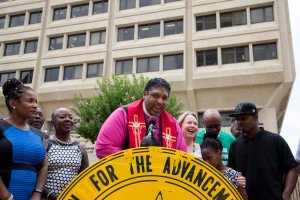I have been a bit remiss in reporting on this case. If you want daily trial updates, you should visit Rick Hasen’s Election Law Blog via the Winston-Salem Journal.
After two weeks of testimony, the Plaintiffs rested their case this week. The state of North Carolina will present its defense beginning Monday. The Winston-Salem Journal reports, Plaintiffs rest case in federal trial over NC voting law:
 After two weeks, attorneys representing the N.C. NAACP and other groups rested their case Friday, having called more than 40 witnesses who testified either in court or via video depositions, that North Carolina’s election law is racially discriminatory.
After two weeks, attorneys representing the N.C. NAACP and other groups rested their case Friday, having called more than 40 witnesses who testified either in court or via video depositions, that North Carolina’s election law is racially discriminatory.
Now, it is the state’s turn to present evidence. Attorneys representing North Carolina and Gov. Pat McCrory called Janet Thornton, an economist, as their first witness. Thomas Farr, one of the attorneys for the state, said they expect to finish presenting evidence by Wednesday.


